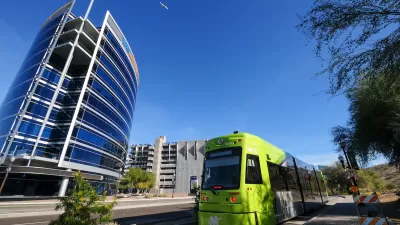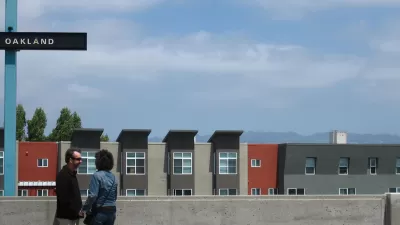We think of shared workspaces as the hot trend in fostering productivity. But libraries have been incubating innovation for millennia. A new program seeks to make libraries a key cog in fostering the start-up economy.
Emily Badger profiles a program being introduced by Arizona State University - named the Alexandria Network after one of history's most famous repositories of knowledge - that seeks to turn public libraries into co-working business incubators.
"This old idea of the public library as co-working space now offers a modern answer – one among many – for how these aging institutions could become more relevant two millennia after the original Alexandria library burned to the ground. Would-be entrepreneurs everywhere are looking for business know-how and physical space to incubate their start-ups. Libraries meanwhile may be associated today with an outmoded product in paper books. But they also happen to have just about everything a 21st century innovator could need: Internet access, work space, reference materials, professional guidance."
In the university's plan, which is starting with a pilot in Scottsdale's Civic Center Library, "[p]articipating libraries will host dedicated co-working spaces for the program, as well as both formal classes and informal mentoring from the university’s start-up resources," explains Badger. "The librarians themselves will be trained by the university to help deliver some of the material. The network will offer everything, in short, but seed money."
"Public libraries long ago democratized access to knowledge; now they could do the same in a start-up economy."
FULL STORY: Why Libraries Should Be the Next Great Start-Up Incubators

Planetizen Federal Action Tracker
A weekly monitor of how Trump’s orders and actions are impacting planners and planning in America.

Chicago’s Ghost Rails
Just beneath the surface of the modern city lie the remnants of its expansive early 20th-century streetcar system.

San Antonio and Austin are Fusing Into one Massive Megaregion
The region spanning the two central Texas cities is growing fast, posing challenges for local infrastructure and water supplies.

Since Zion's Shuttles Went Electric “The Smog is Gone”
Visitors to Zion National Park can enjoy the canyon via the nation’s first fully electric park shuttle system.

Trump Distributing DOT Safety Funds at 1/10 Rate of Biden
Funds for Safe Streets and other transportation safety and equity programs are being held up by administrative reviews and conflicts with the Trump administration’s priorities.

German Cities Subsidize Taxis for Women Amid Wave of Violence
Free or low-cost taxi rides can help women navigate cities more safely, but critics say the programs don't address the root causes of violence against women.
Urban Design for Planners 1: Software Tools
This six-course series explores essential urban design concepts using open source software and equips planners with the tools they need to participate fully in the urban design process.
Planning for Universal Design
Learn the tools for implementing Universal Design in planning regulations.
planning NEXT
Appalachian Highlands Housing Partners
Mpact (founded as Rail~Volution)
City of Camden Redevelopment Agency
City of Astoria
City of Portland
City of Laramie





























